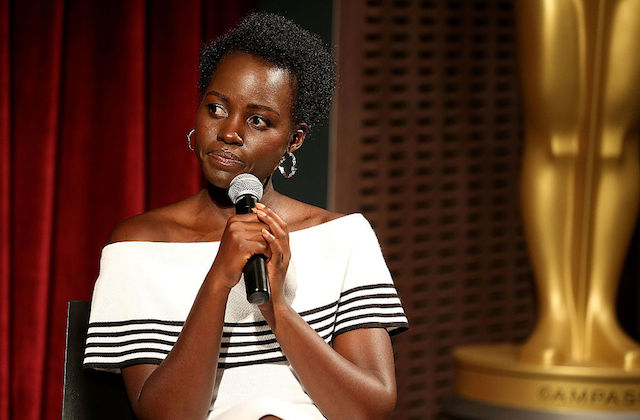Oscar-winning actress Lupita Nyong’o ("Queen of Katwe") details her encounters with Hollywood producer Harvey Weinstein in an essay published by The New York Times yesterday (October 19). The Mexican-born Kenyan thespian is the first Black star among the growing number of women accusing Weinstein of sexual harassment and violence.
"I had shelved my experience with Harvey far in the recesses of my mind, joining in the conspiracy of silence that has allowed this predator to prowl for so many years," Nyong’o writes. "I had felt very much alone when these things happened, and I had blamed myself for a lot of it, quite like many of the other women who have shared their stories."
Nyong’o’s account includes elements common among other accusers’ stories. She met Weinstein while attending Yale Drama School, and the producer invited her to his Connecticut home to watch a movie with his family in 2011. There, he proposed a massage. She left the room when he tried to take off his pants.
"I didn’t quite know how to process the massage incident," Nyong’o explains. "I reasoned that it had been inappropriate and uncalled-for, but not overtly sexual. I was entering into a business where the intimate is often professional and so the lines are blurred."
That blurriness impacted her subsequent interactions with Weinstein, including one night when he propositioned her over dinner. When Nyong’o declined, he bragged about other actresses he slept with and said that she would not succeed in the industry without conceding to him. She refused again, and Weinstein’s cold reception made her fear he would end her career:
His whole demeanor changed at that point. “Then I guess we are two ships passing in the night.” I had never heard that saying before, so I remember asking him what it meant. “It means just that,” he said. “We are two ships going in two different directions.”
[…]
We got up, having not eaten anything, and he led me out of the restaurant. My heart was beating very fast. A cab was hailed for me. I said I would take the subway (I could not afford a cab at the time), but he handed me some money and told me not to be silly, take the cab. Before I got in, I needed to make sure that I had not awakened a beast that would go on to ruin my name and destroy my chances in the business even before I got there.
“I just want to know that we are good,” I said.
“I don’t know about your career, but you’ll be fine,” he said. It felt like both a threat and a reassurance at the same time; of what, I couldn’t be sure.
Nyong’o says that other women’s candor about Weinstein’s abuse, which includes allegations of rape and retaliatory threats, helped end her silence. “What I am most interested in now is combating the shame we go through that keeps us isolated and allows for harm to continue to be done. I wish I had known that there were women in the business I could have talked to. I wish I had known that there were ears to hear me. That justice could be served. There is clearly power in numbers. I thank the women who have spoken up and given me the strength to revisit this unfortunate moment in my past."
Testimonies like Nyong’o’s have inspired outrage and criticism about patriarchal dynamics and sexual violence. The Los Angeles Times notes that several rape accusations prompted police departments in Los Angeles, New York City and London to investigate Weinstein.
Read Nyong’o’s full essay at NYTimes.com.
